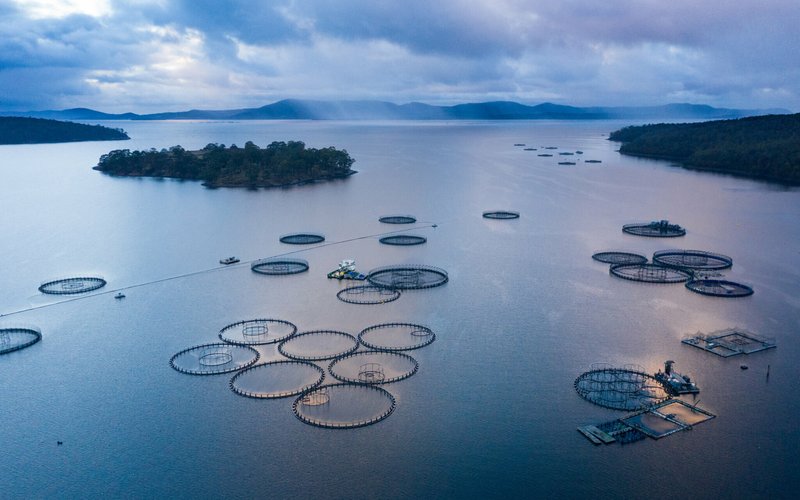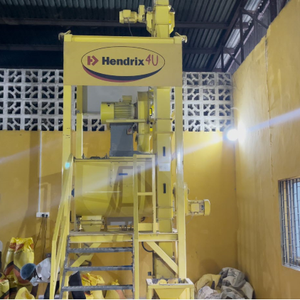Recognizing the power of both a collaborative response and private sector leadership in delivering on aquaculture’s potential, Global Salmon Initiative and FUTUREFISH, with support from the Bill & Melinda Gates Foundation, convened a roundtable of aquaculture industry leaders. The roundtable, hosted in Amsterdam, the Netherlands on May 25, 2022, brought together chief executive officers and senior executives from aquaculture companies, including producer, seed, feed, health and investor organizations representing a global perspective, with the aim of harnessing their expertise and ambition to accelerate industry-wide progress.
Those gathered at the roundtable reflected on what the world needs from aquaculture, the potential of collaboration, and the barriers and change levers to catalyze progress. Together, they developed a Call to Action, representing a new and overarching commitment to advance global aquaculture industry leadership. The aim of this Call to Action is to mobilize a sustainable future for purpose-driven aquaculture, meaning one that provides nourishment in equitable and climate-resilient ways. The Call to Action serves as a contribution to the UN Ocean Conference and will help ensure a greater role for aquaculture in helping to achieve the SDGs by 2030.
The Call to Action, ultimately agreed upon by executives from over 30 aquaculture companies and organizations, responds to the UN’s call for ocean and freshwater action and represents the priorities and commitments of select industry leaders. Together, they recognized:
- The world’s need for more high-quality, environmentally-responsible sources of protein.
- The world’s need to ensure food is produced in efficient and environmentally sound ways.
- The world’s need for more equitable social outcomes of aquaculture.
- That while aquaculture has been growing, innovating and improving.
- Business as usual will not deliver the scale of change needed.
Responding to such challenges, the group’s vision is to drive toward full delivery of the potential of aquaculture by producing more nutritious and sustainable food. Doing so will improve global food security, and achieve greater social and economic benefits. The leaders prioritized eight action areas.
Learning and sharing experiences
- Establish a learning and acceleration hub and related database to collect and encourage the wider use of proven models to scale sustainable aquaculture production, such as pre-competitive collaboration platforms, innovative financing systems and open platform technology sharing.
- Aggregate business case examples for breaking the ‘commodity trap’ to help support producers investing in sustainable products and inform market-specific regional opportunities, accounting for distinct cultures and business climates.
Supporting development of future regulation and infrastructure
- Develop a comprehensive white paper that describes the business case for aquaculture’s role in supporting healthy, sustainable diets and communities, and provides a framework for evolving and forward-looking regulatory regimes, needed infrastructure and other opportunity areas.
- Support evolution of forward-looking aquaculture regulatory systems to encourage environmentally- and socially-sustainable growth for the sector.
- Expand inclusive, sustainable financing opportunities to support growth – encouraging the flow of finance into sustainable aquaculture to promote food and nutrition staples for smallholders, women and youth at scale.
Supporting technology adoption and innovation
- Assess opportunities for pre-competitive collaborations in aquatic genetic resources, considering better aquatic animal nutrition, genetic improvement programs, regional focus and diversification.
- Create global and regional hubs and mechanisms for technology transfer on effective innovations and best practices to accelerate dispersion at scale, including underserved regions such as Africa.
Increasing transparent communication to all stakeholders
- Communicate the role of aquaculture in supporting nutritious, resilient food systems more effectively by providing transparency to all stakeholders on the sector’s ongoing efforts to improve and deliver a responsible and healthy source of food.
The aquaculture leaders who contributed to this Call to Action have committed to these action areas. In doing so, they commit to driving the sector’s sustainability forward at speed and scale. They recognize the need to encourage wider participation, particularly from underserved regions, and will continue to reach out and engage. A global leadership group of select executives will also convene to monitor progress and take necessary actions to ensure that change happens on the ground. We call on partners to join and collaborate with the aquaculture industry in achieving this vision.













